Iran’s Foreign Minister Visits Armenia Following Military Drills At Border
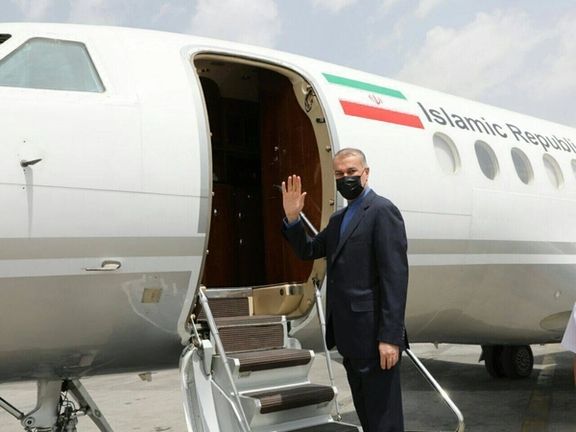
Iranian Foreign Minister Hossein Amir-Abdollahian, heading a delegation, has traveled to the Armenian capital Yerevan on Thursday amid tensions in the region.

Iranian Foreign Minister Hossein Amir-Abdollahian, heading a delegation, has traveled to the Armenian capital Yerevan on Thursday amid tensions in the region.
In his first visit to Armenia, Amir-Abdollahian is scheduled to meet with his counterpart Ararat Mirzoyan as well as some other officials in the country to discuss the latest regional developments.
This week, Iran’s Revolutionary Guards (IRGC) held a large-scale military drill in the northwestern region of Aras along the borders of Armenia and Azerbaijan.
In mid-September, Iran warned that it would not tolerate any seizure of territory from Armenia by Azerbaijan after military clashes broke out between its two northern neighbors.

Armenia accuses Azerbaijan of attacking its towns to avoid negotiations over the status of the mainly Armenian-populated enclave of Nagorno-Karabakh in Azerbaijan, an enclave which is inside Azerbaijan but populated mainly by ethnic Armenians.
Iran has to an extent supported Armenia in the conflict with Azerbaijan and has warned that it would not allow any seizure of territory from Armenia proper by Baku. Tehran in the past has also expressed alarm at alleged Israeli military presence in Azerbaijan.
Iran’s ally Russia, itself engaged in the military invasion of Ukraine, is a key power broker in the region and an ally of Yerevan through the Moscow-led Collective Security Treaty Organization (CSTO). Turkey backs Azerbaijan.
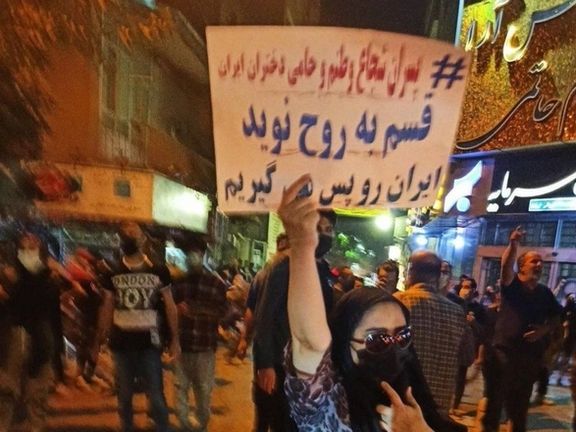
Iran said it was sanctioning British individuals and entities over “activities that have led to unrest, violence, and terrorist acts against the Iranian nation.”
These included Tom Tugendhat, Minister of State for Security, Commodore Don Mackinnon, British naval commander in the Persian Gulf, and Steve McCabe, member of parliament ad Chair of Labour Friends of Israel, as well as media outlets and their owners including BBC Persian and Iran International. Iran also cited the UK National Cyber Security Centre (NCSC) and the intelligence center known as ‘GCHQ.’
During recent unrest, Iranian officials have complained about foreign media and social media operators, including those in Britain reporting on protests and airing interviews with Iranian pundits based abroad, including state-funded media. The clerical regime in Iran has taken exception to news and commentaries it claims are justifying attacks on government employees and ambulances, while it does not allow the media in Tehran to report on the protests.
The government has also often cut off access to the Internet or slowed down cyber traffic for more than a month to prevent news and images of the protests from being shared among the people.
The official news website IRNA said the named individuals would not be allowed to enter Iran and that any assets held under Iranian jurisdiction would be confiscated. It said the measure did not preclude criminal prosecution and that Iran still considered the British government “accountable for supporting terrorists and human rights violators who organize and incite riots and terrorist acts in Iran from its soil.”
Foreign Minister Hossein Amir-Abdollahian also said Wednesday Iran would designate 19 US and European officials and entities over sanctions and “incitement to violence.”
Iran has been persecuting journalists working for the BBC, US funded international broadcasters Voice of America and Radio Farda, as well staff at Iran International and other media organizations. Family members have been harassed for more than a decade and direct threats made against journalists.
Iran’s 83-year-old ruler Ali Khamenei and other officials have blamed the protests on “foreign enemies” and “their media”, while pundits and some politicians in Iran have been warning for months that the social and political atmosphere was ripe for popular demonstrations and unrest.
In fact, protests have been going on almost continuously since December 2017, when rising prices first led to nationwide disturbances. In November 2019, a sudden government hike in gasoline prices also led to widespread protests during which security forces killed at least 1,500 civilians.
The current protests that started on September 16 were triggered by the death in police custody of Mahsa Amini, a 22-year-old woman who was arrested three days earlier for her "improper hijab." Women and young people have led the protests demanding regime change, with their favorite slogan being "Death to the dictator."
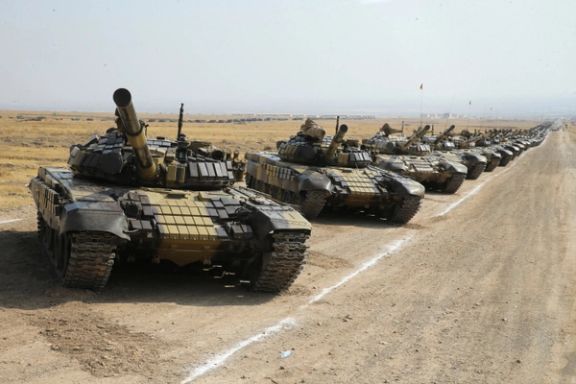
Iran’s Revolutionary Guard in a provocative move has launched a pontoon bridge on the northwesternmost river of Aras near the border with Azerbaijan Republic.
A video published by the IRGC-affiliated website Tasnim shows on Wednesday the ground forces set up pontoon bridges on the river for the armored vehicles and tanks to pass.
It has also been said in the video that installing these bridges have a message and the target audience will receive and understand.
The IRGC special forces also conducted heliborne operations with Mil Mi-17 helicopters on the third day of their wargames in the Aras region.
On the sidelines of the maneuvers Commander of the IRGC Hossein Salami threatened the neighbors that “Iran’s fraternity policy continues as long as there is no plot hatched by the enemies.”
“We have interests in this region, so if something happens in any corner of it, our interests will be jeopardized, then we won’t remain neutral and will defend our interests,” said Salami.
In the meantime, the IRGC has also published a tweet in Arabic saying, “When we split the waters and rescue you!”
Some social media activists have interpreted this tweet as a threat aimed at Azerbaijan Republic saying that since its establishment in 1979 the Islamic Republic has always tried to create crises outside its borders to make up for its inability to deal with domestic problems.
“That’s why the Islamic regime launched a war with Iraq to crack down on its opposition inside Iran back in the 1980’s,” says a video tweeted by a user.
In mid-September, Iran warned that it would not tolerate any seizure of territory from Armenia by Azerbaijan after military clashes broke out between its two northern neighbors.
Azerbaijani troops entered Armenia’s southern region in a move that seemed aimed at seizing territory and cutting off Armenia from Iran. Tehran has warned that it will not tolerate losing its land connection with Yerevan.
Armenia accuses Azerbaijan of attacking its towns to avoid negotiating over the status of the mainly Armenian-populated enclave of Nagorno-Karabakh inside Azerbaijan.
Tehran in the past has also expressed alarm at alleged Israeli military presence in Azerbaijan.
The provocative launch of pontoon bridge and Iran’s message to its neighbors come at a time that the clerical regime has received the strong message from protesters who now shout, “Death to Khamenei” and “Death to Dictator” every day and night to topple the regime.
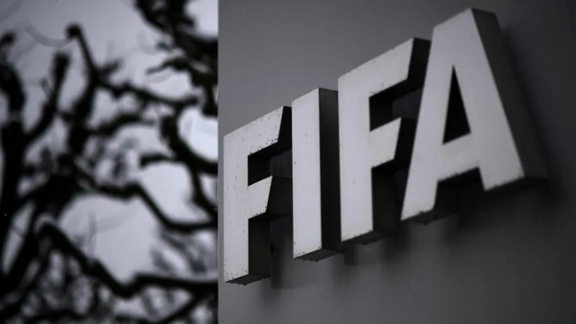
A British member of parliament says international football (soccer) governing body FIFA should stop Iran from participating in the World Cup for its supply of weaponry for the Russian invasion of Ukraine.
Labor MP Chris Bryant, the chair of the All-Party Parliamentary Group on Russia and former Foreign Office minister, told Telegraph Sport on Monday that any country founded to have “provided military support” for Russian President Vladimir Putin’s invasion should be banished from world sport.
He called on FIFA to make a move before Iran’s national football team’s opening match against England.
Referring to FIFA and UEFA’s decisions to throw Russia out of the international football events in the wake of Putin’s invasion of Ukraine, including from March’s World Cup play-offs and the entire 2024 European Championship, he said, “Sporting authorities around the world and in every sport should be looking very carefully at Iran’s direct engagement and support for Putin in his illegal invasion of Ukraine.”
“Dictatorial regimes relish sporting success. We should deny them that opportunity,” he noted.
Since March, many Iranians themselves have been urging FIFA to ban Team Melli from the World Cup for forcibly barring women from entering stadiums to watch matches. Under FIFA pressure, Iranian authorities started to let in a cherrypicked group for women so they would not face bans and penalties. However, since the start of the current uprising across Iran and a lackluster support from the national squad, the calls on FIFA to ban Iran have become stronger.
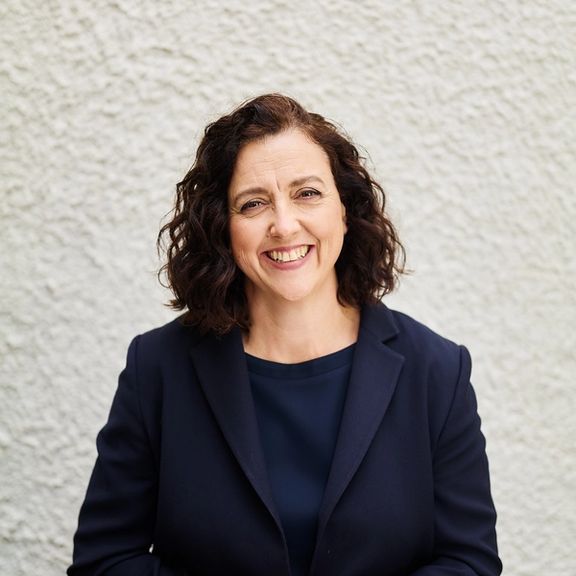
An Australian MP says Canberra must designate Iran's Revolutionary Guard as a terrorist organization and cooperate with UN states to remove Iran from the women commission.
Monique Ryan told Iran International’s correspondent that the government of Prime Minister Anthony Albanese should also work with other UN states to remove Iran from United Nations Commission on the Status of Women (CSW) amid the Islamic Republic's crackdown on the current uprising spearheaded by Iranian women and ignited by the death in custody of 22-year-old Mahsa Amini.
Expressing grave concern over “what has been done to young people in Iran by the government,” she praised the courage of people “for standing up for their rights.” She added, “Being physically punished for that is deeply shocking and very concerning for all Australians.”
Referring to a letter to the Albanese Government signed by her as well as several other lawmakers, she said they called on Canberra to act “more forcefully to express the repugnance felt by the Australian people towards the recent treatment of peaceful demonstrators."
She said they specifically requested Magnitsky-style targeted sanctions including financial asset freezes and travel bans against members of the Revolutionary Guards (IRGC), key security officials and the so-called morality police. “We also asked the government to declare the IRGC as a terrorist force as has been done in the US and Canada,” she said, adding that they also called on the government to join other states to remove Iran from the UN Commission on the Status of Women.
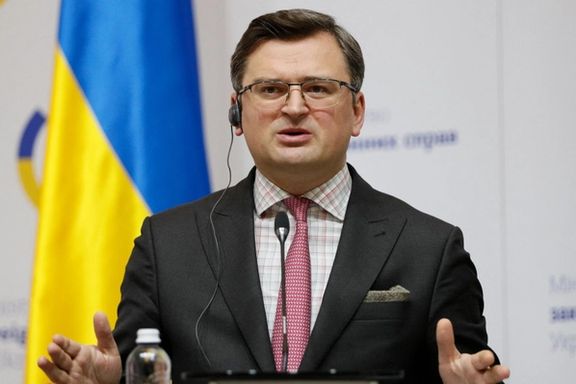
Foreign Minister Dmytro Kuleba said Tuesday he had called on President Volodymyr Zelenskyy to break off Ukraine’s diplomatic relations with Iran.
Kuleba said Kyiv was willing to share a “bag of evidence” with the European Union that Russia had used Iranian-made military drones in the current conflict. The EU is currently considering sanctions against Iran should the Ukrainian claims be proved.
Russia used dozens of ‘kamikaze’ drones in attacks Monday that Ukraine says were Shahed-136s, killing four people in Kyiv. “Tehran bears full responsibility for the destruction of relations with Ukraine”, Kuleba told a news conference.
While Iran has denied supplying drones to Russia, analysts point out they could be a cheap if less effective alternative to Russia’s diminishing stocks of missiles. The State Department’s Vedant Patel Monday backed up Ukraine’s claims, saying there was “extensive proof” Russia was using Iranian-made drones.
Iran has been a close military ally of Russia in the Syrian war, where Moscow supplies air power and Tehran tens of thousands of militia ground troops to defeat the opponents of Bashar al Assad's government.
Iran's Supreme Leader Ali Khamenei also backed Vladimir Putin in July by praising the Russian leader's "initiative in in invading Ukraine.
‘Pressure on Israel’
In his press conference, Kuleba also said Kyiv would send an official note to Israel seeking military aid including air defense supplies. Disappointed at Israel’s refusal to supply weapons, Ukrainian officials have sought to highlight Iran’s relationship with Russia.
Ukraine and Iran have maintained diplomatic relations despite disagreements and an exchange of sharp language over the January 2020 shooting down by Iranian air defenses of a Ukrainian passenger plane, killing all 176 aboard, during heighted US-Iran tensions.
In an analysis Tuesday, the New York Times argued that a Tehran-Moscow “alliance” was “raising the pressure on Israel, Iran’s sworn enemy, to take Ukraine’s side in the war.”
On Sunday Nachman Shai, Israel’s Minister for Diaspora Affairs, argued for sending military aid to Kyiv on top of existing humanitarian relief. But Tuesday, before Kuleba’s remarks, Justice Minister Gideon Saar, who sits on Israel’s decision-making security cabinet, told national broadcaster Army Radio that Israel’s support for Kyiv “does not include weapons systems and weaponry - and there is no change to that position.”
‘Reckless’ supply
Dmitri Medvedev, deputy head of Russia’s Security Council, warned Monday that “reckless” supply of Israeli hardware would “destroy all interstate relations between our countries.” Around 15 percent of voters in Israel, where there is a general election November 1, are Russian-speakers. Israel has also had intelligence coordination with Russia in Syria, where both air-forces have operated during the decade-long conflict.
Ukraine has been successful gaining military aid from the European Union, whose foreign ministers’ meeting in Luxemburg Kuleba addressed virtually Tuesday “from the bomb shelter.” The foreign minister tweeted that he had asked the Europeans for “more air defense and ammunition” and for “sanctions against Iran for supplying the Russian Federation with drones.” The EU announced Tuesday a further €500-million ($492 million) military supplies to Ukraine, bringing the total to €3.1 billion ($3.01 billion). United States support is around $17 billion so far.